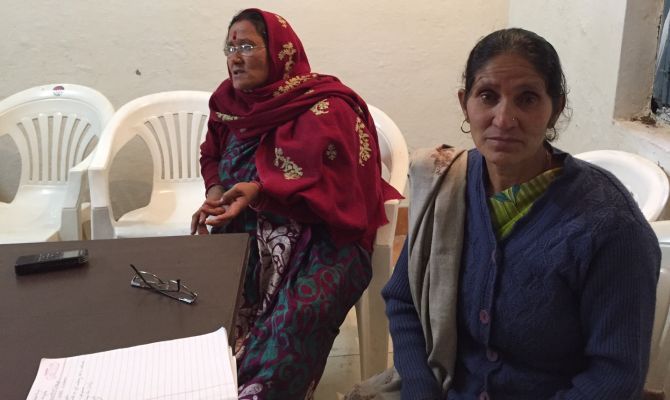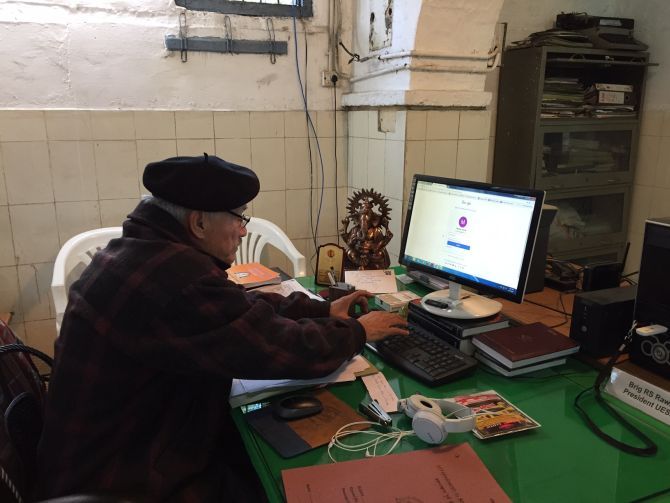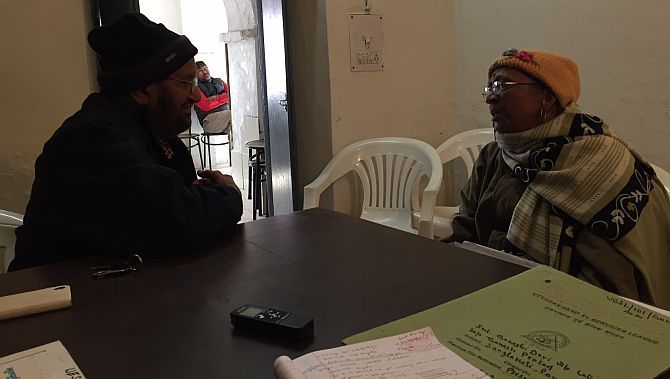'Political parties have appropriated our military victories -- the Kargil war is the BJP's and the Bangladesh war is the Congress's -- what is going on?'
As Uttarakhand -- where faujis number nearly 40% of the state's population -- prepares to vote, Rediff.com's Archana Masih discovers what upsets retired soldiers in Uttarakhand the most is a forgotten protest in the heart of Delhi.

The flowers under the flag post at the Uttarakhand Ex-Servicemen's League office in Dehra Dun are wet after the morning rain, but the petals appear fresh.
It is the day after Republic Day, and a retired officer troops in saying that army officers who had been issued special passes and had arrived in full uniform to attend the parade in New Delhi could not find a place to sit.
"The seats were taken up by the police chaps and their families. This is the state of army men in Modi's raj," he says, sitting down to write the details of a distressed mother, who has come into the office for the first time.
The lady has not got the dues after the death of her 23-year-old son, a young lieutenant who died in a road accident while on duty in 1999.
The Uttarakhand Ex-Servicemen's League office is a refuge for army widows, retired servicemen and officers who have been deprived of the right of compensation or are receiving less pension than what is due to them.
Under the stewardship of retired Brigadier R S Rawat, president of the League, the organisation has a handful of retired officers who work pro bono so that widows and ex-servicemen get what is rightfully theirs.
"My husband got his leg cut off in the service of Bharat Mata, but hasn't got any disability compensation. He started getting a pension of around 20,000 only last month, before that it was 16,000. Is this the reward for serving Bharat Mata for 27 years?" asks Kamla Devi, tears running down her cheeks.
An infection resulted in the amputation of her husband's foot while he served the Defence Services Corps after his retirement from the Indian Army's artillery section as a havaldar.
Kamla Devi, mother of five young girls, has tried her best for compensation with no luck.
Once when she was told that Uttarakhand Chief Minister Harish Rawat was scheduled to visit the League's office, she carried her husband there. To her misfortune, the CM arrived early and she missed the chance of telling him her problem personally.
"I have been failed by the fauj and the government. This time I am going to press all the buttons at the same time on the voting machine, so that my vote gets disqualified," she says, just as retired Colonel Cheema, a Bangladesh war veteran tells her that she has the option of 'None Of The Above' if she does not want to vote for any candidate in the assembly election.
Uttarakhand goes to the polls on February 15.

A retired general says of him, "He's junior to me, but I salute him for the work he is doing."
Sitting beside her is Bimla Devi Negi whose husband, an honorary subedar major, died while in service after 29 years in 2005.
She hasn't got one rank one pension and wonders why the widow of a sepoy -- junior in rank to her husband -- draws more pension than her.
When OROP was meant to bring servicemen's pensions at par with each other, why hasn't it happened with her, she asks.
One Rank One Pension was implemented by the Narendra Modi government in September 2015, but ex-servicemen stress that it has not been implemented fully and has been "twisted" in its interpretation.
Explaining the shortfalls of One Rank One Pension or the details of the 7th Pay Commission, the officers flip through the government's compensation handbooks and painstakingly calculate what is the correct amount due, the difference to be paid etc.
Brigadier Rawat works on charts on his computer and uploads the cases on the prime minister's office grievance redressal site.
Since most of the women do not have email, he gives his own e-mail for the communication.
Retired military officers, formally dressed in a habit carried on from the culture of the mess dress code, walk in and out.
Many retired soldiers from Uttarakhand have participated in the OROP protest at Jantar Mantar in Delhi.
One of them, Major General Lalji D Singh (retd), a veteran of three wars, whose son and granddaughter are army officers, has participated in the protest 30 times.
"We are soldiers, we go to war on a verbal order given by the commanding officer. We trust the word," says General Singh.
"The prime minister made a vow to us in front of 2.5 lakh servicemen in Rewari, Haryana, and under the flag on August 15 at the Red Fort that he would give OROP. We trusted him; voted for him, but we have been let down."
Ex-servicemen, who number nearly 200,000, in addition to their families, will play a significant role in the outcome of the Uttarakhand election.
While many say that OROP has been 85% been fulfilled, which the Congress government did not do even when soldiers returned their medals, others say what they have received is enhanced pension, not OROP.
"It is in fact, One Rank Five Pensions," says Colonel Cheema, "My pension continues to be less than what a recently retired colonel gets."
Though the government sanctioned OROP, which has brought pensions close to what is due, it has not been implemented as sanctioned by Parliament.
The anomalies have twisted the very definition of OROP and comes with many strings attached, which need to be removed, adds retired Brigadier K G Behl.
"In Rewari or Siachen or at the Red Fort or in Parliament, the prime minister did not say he will give us only 80% to 90% of what was promised, but when it was translated it turned out to be something quite different," says Brigadier Rawat.
OROP states that defence personnel retiring at the same rank and the same length of service, irrespective of year of retirement, will get the same pension.
"Ex-servicemen from the hills of Uttarakhand are very tough soldiers, but are not well informed," says General Singh.
"They get happy that the basic pension -- that has been increased by 2.57% -- has come into their bank accounts, but do not know what the pending amount is that the government still owes them," the general adds.
"A subedar who retired several years back when he fought the war with no electricity, water, roads, without modern equipment, jeeps or proper uniform realises that his counterpart blessed with a mobile phone, good military equipment and the best of walking boots is getting more pension than him if he has retired recently," explains Brigadier Rawat.
"It is to be seen how the ex-servicemen vote in this election," the brigadier adds. "It appears that some people have been dogmatised or ideologised even though they have not got a fair deal by the government. This is the dilemma today."
Pointing out to the glaring anomalies in pensions to widows whose husbands died while in service and the gross disparity when compared to civilian counterparts in government, Brigadier Rawat says the status of soldiers has been steadily reduced.
"A soldier may have become disabled while on duty, but gets a lesser disability compensation than a civilian counterpart who may have slipped in North or South Block," he points out.
"There are several clauses like this that have been struck down by the service headquarters and the government is supposedly having a rethink -- does it take so long to have a rethink?" asks Brigadier Rawat.

The retired officers are also deeply upset with the reduced stature of the military.
They point to the army chief -- General Bipin Rawat, is incidentally, a native of Uttarakhand -- being number 42 in the list of precedence and give instances of ministers, IAS officers occupying seats ahead of senior military officers.
A colonel was once senior to a collector, but now has been downgraded to the stature of a head clerk, says Colonel Cheema.
"Moreover, a jawan serving in Siachen gets a (disturbed area) allowance of 31,000 while an IAS/IPS officer posted in Guwahati, Agartala or Tripura sitting in an AC office gets an allowance of 77,000; a disabled officer gets 27,000 while a disabled IAS officer gets 63,000 -- so a bullet injury of a soldier is considered less than a car accident of an IAS officer?" the colonel asks.
A national war memorial is another unfulfilled promise that scrapes at their collective hearts.
The one coming up in Dehradun exists more on paper than on the ground.
"Other countries have a glorious war memorial and ours has been made by the British whom we curse. We are a country where ex-servicemen and servicemen have to demand for it," says Brigadier Rawat.
"Political parties have also appropriated military victories -- Kargil is the BJP's and the Bangladesh war is the Congress's -- what is going on?" he asks.
"We are soldiers, we don't fight for the BJP or Congress," interjects General Singh. "We fight for the nation."
Citing the example of how America treats its military veterans, General Singh mentions how when he was travelling on a flight to Chicago he happened to mention to a fellow passenger that he was a retired general of the Indian Army.
Word got around and when he disembarked, a porter greeted him as an Indian Army veteran and escorted him out of the airport.
Talking about the Veteran's Museum in Chicago and a Veteran's Park in Atlanta, the general shakes his head at the way India treats its soldiers.
"We are not beggars, we are asking for our due according to OROP, not an extra naya paisa."
A havaldar saved his life in the 1962 War with China and the general remembers that sacrifice over 54 years later, tears running down his face. "How many politicians have children in the army? Tell me?" he asks.
"And we have a minister of state for defence who says that some disgruntled elements are protesting in spite of getting OROP -- now we armymen have become 'disgruntled elements'."
Pained that the government is turning a blind eye to its veterans who have been protesting for nearly 595 days at Jantar Mantar, says te general, "Look at what happened in Chennai over Jallikattu and during the Jat agitation in Haryana. Not a single chair has been broken by ex-servicemen at Jantar Mantar -- why?"
"We have taken an oath to safeguard the Constitution -- and we stand by that."
On February 15, when these military veterans go out to vote in Uttarakhand, the protest at Jantar Mantar and the plight of an ex-officer's wife hospitalised after being on hunger strike for a week, will not be far behind.











 © 2025
© 2025